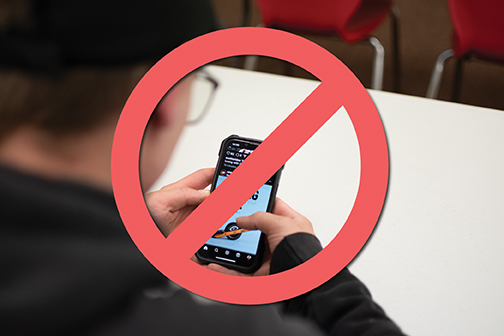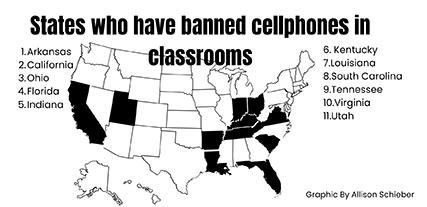By KAROLINA JURESIUTE, Senior Reporter
The constant urge to check notifications, the subtle glow of a screen under a desk, lots of screen tapping during a lecture.
These digital intrusions have become constant challenges not only in Alva High School classrooms but in the whole country. Students are missing instructions, struggling to focus and declining in class engagement all because of the technology.
Seventeen states have laws or policies on K-12 classroom cellphone usage, while 11 states– Arkansas, California, Ohio, Florida, Indiana, Kentucky, Louisiana, South Carolina, Tennessee, Virginia and Utah – have a ban on cellphones in classrooms.
The battle of buzzing, pinging and vibrating cellphones is now at the top of a growing movement to ban phones during learning periods across the state of Oklahoma.
Two similar bills are being discussed in the legislature. A House committee has approved the Senate Bill 139 with an 8-3 vote and a Senate committee has approved the House bill 1276 with a 7-4 vote.
Oklahoma now has to choose which bill they want to pursue as their final choice to be approved by the full Legislature.
If the Senate Bill 139 is approved, Oklahoma schools would first try the phone ban for a year before deciding what to do it permanently.
The policy will be required to be updated and approved annually.
If the House Bill 1276 is approved, schools would be required to adopt a policy that prohibit phones for the entire school day before the 2025-26 academic year.
Many of Oklahoma’s largest school districts like Bixby, Jenks, Tulsa and Union already have phone limit rules or prohibits the use during school hours.
According to a Oklahoma Business Voice article, Oklahoma Gov. Kevin Stitt said cell phones are distractions, and they should be banned in classrooms.
Distraction is not the only problem that phones create, Valerie Rider, Alva High School counselor, said phones are often used to bully other students by posting pictures or mean comments of other students.
Some kids take inappropriate pictures of them and send them out to other students. Bullying could be drastically lowered if the phone ban passes the bill, she said.
“Personally, in my classroom, I do not let them have their phones out,” said Crystal Murrow, English teacher at Alva High School. “but when I do see it, I immediately tell them to put it away, and they’re real respectful. They put it away, and then we go on with the lesson,” “But yes, it can be a distraction for those kids because, they want to be on it constantly.”
Mary Tyree, physical science, aeronautics and stem class teacher at Alva High School, said she doesn’t have a lot of problems with cell phones and uses them quite often in her classroom for educational purposes.
“Sometimes it’s helpful for if they need to use it as a calculator real quick, if I’m short a few,” Tyree said. “It’s helpful if they forget their computer; some of them are able to pull up the assignment on their phone. Sometimes, like with the technology side of what I teach, we might use an app, like we use the phones to fly the drones, for example. So, definitely In my class, probably more than a lot of others, we do use phones.”
Many parents in Alva see the cell phone ban as a positive step toward creating a more focused learning environment for their children.
“I do think that they are a huge distraction in school,” Gretchen Jones, an Alva High School student’s parent, said. “I think that they are used for more of finding the answers to things, rather than the kid actually learning how to do the problem, whether it’s history, whether it’s math, whether it’s whatever. The chat GPT thing is crazy. I mean, now you don’t even have to write your own papers, and it’s available on your phone.”
Jones said there’s a purpose for the ban and for everything.
“I do think there needs to be a block put on there that its only for emergency use only, that type of thing,” Jones said. “If they told my kids they had to leave their phones at home, I would be totally fine with that.”
Tyree said she has about 100 students, and maybe only five of them have an issue with phones. They listen to her pretty well when she asks them to get off of it.
“I think that it would be nice to have a rule that was across the whole school, and so if it was just not allowed, then we wouldn’t have to think about it,” Tyree said. “I would have to change some things that I do, but I think that would help a lot of teachers to just have that support of it being a rule.”
If the law passes, there will have to be lot of new adjustments for the teachers and students themselves.
“It would be an adjustment,” Tyree said. “but also, I’ve had students be relieved whenever I’ve told them they can’t be on their phone because, say their mom is messaging them all the time and they’re like I can just tell her that I can’t be on it, so its nice to have that break. I feel like the benefits would outweigh the negatives.”

Jones highlighted the challenge of transitioning students accustomed to background noise for focus to a silent classroom environment, acknowledging the need to an adjustment.
“I do have a kiddo that she focuses better when she has like music playing in her room, so she has her AirPods in and things like that, but the problem with that is that she’s not focused on what the teacher is telling her,” Jones said. “So, she’s going to have to train herself not to have that.”
With the phone ban in place, it will be hard for students to get used to the new changes, but it will bring lots of good outcomes.
“At the high school level, we’re trying to teach them to be young adults that are gonna be in the workforce,” Tyree said. “So, I think if they can learn to time manage and understand like they’ve got to do their work and on breaks then they can check their phone. They have to teach themselves to lock in on the lesson and not get on their phone until they’re done.”
Tyree said she thinks the phone ban would help students stay more focused in class. She has also noticed that each year her students seem to have less ability to stay focused on an assignment as long.
“It could improve their reading skills and maybe even like ADHD would go down and just removing that distraction I think would help them,” Tyree said.
Murrow said she thinks the phone ban will improve the learning.
“I feel like if all the teachers are on the same page,” Murrow said. “and that we are all going to implement the ban, and I think we enforce it as an entire school, I think we will see improvement in their scores and then learning overall. I think that their focus will be diverted from their phones to the classroom.”
Murrow said at first it is going to be a struggle. She thinks that it’s going to be like a learning curve as with anything. Teachers will see a little pushback at the beginning, but once they kind of get used to it, it’ll be fine. Murrow said it’s going to take them a good month or two of getting into the routine of not having the phone.
According to Pew Research Center, 72% of high school teachers in the U.S. said cell phone is a huge distraction in the classrooms.
The survey also says that 33% of middle school teachers said the cell phone is a significant problem among students.

